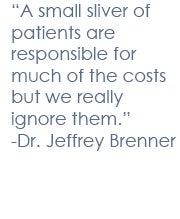Above, watch the full event on health care “hotspotting” with Camden Coalition of Healthcare Providers Executive Director Dr. Jeffrey Brenner.
The expensive and inefficient nature of the American health care system is nothing new. But a clear understanding of the reasons for high health care costs and poor quality may finally bring us closer to improving these problems.
For the kickoff talk for the Aspen Institute Public Health Grand Rounds lecture series, Dr. Jeffrey Brenner, a 2013 MacArthur Fellow, explained how he used ‘health care hotspotting’ to identify the reasons for high costs in Camden, New Jersey. Brenner, a family physician and executive director of the Camden Coalition of Healthcare Providers, defines hotspotting as “using data sets to find outliers, with the idea that outliers are often the canary in the coal mine,” said Brenner. “Outliers will tell you the failures of a complex adaptive system.”
Outliers in the context of health care are patients who are responsible for a large amount of costs because they receive the bulk of a health care system’s medical treatments and services.

“A small sliver of patients are responsible for much of the costs but we really ignore them,” said Brenner.
For one case study, Brenner described an outlier patient who had nine emergency room visits, six admissions to the hospital, 12 medications a day, and several serious medical conditions, including kidney failure and cancer. By looking into this case, Brenner revealed that one main reason for the high cost of care is because the various medical departments treating this patient — and others — are disjointed and are not trained to collaborate with each other.
“This is a multi-layer problem that goes to the core of how we frame our services, how we train our providers, and how we move data around. And we are just at the very beginning of how to think this problem through,” said Brenner.
But in addition to hotspotting results pointing to needed changes in the framework of the health care system, Brenner notes that there needs to be a paradigm shift in how we understand why people develop health problems. According to the groundbreaking yet widely unknown Adverse Childhood Experiences (ACE) study conducted by the Centers for Disease Control and Kaiser Permanente, the occurrence of traumatic childhood experiences such as death of a parent and abuse is highly predictive of serious health-related issues.
“When you add up the number of categories of the adverse childhood experiences you have had… not how many times you had it happen, just the existence of the category, it is the best predictor we have ever found for health spending, health utilization, for obesity, substance abuse, smoking, alcohol, for poorly controlled chronic illness, and out of wedlock teen birth,” said Brenner.
Brenner believes that with these results in mind the health care industry needs to rethink its approach to treating patients.
“We are asking the wrong question,” said Brenner. “Instead of asking, ‘what’s the matter with you?’ we need to start asking ‘what happened to you?’”
RELATED CONTENT:

